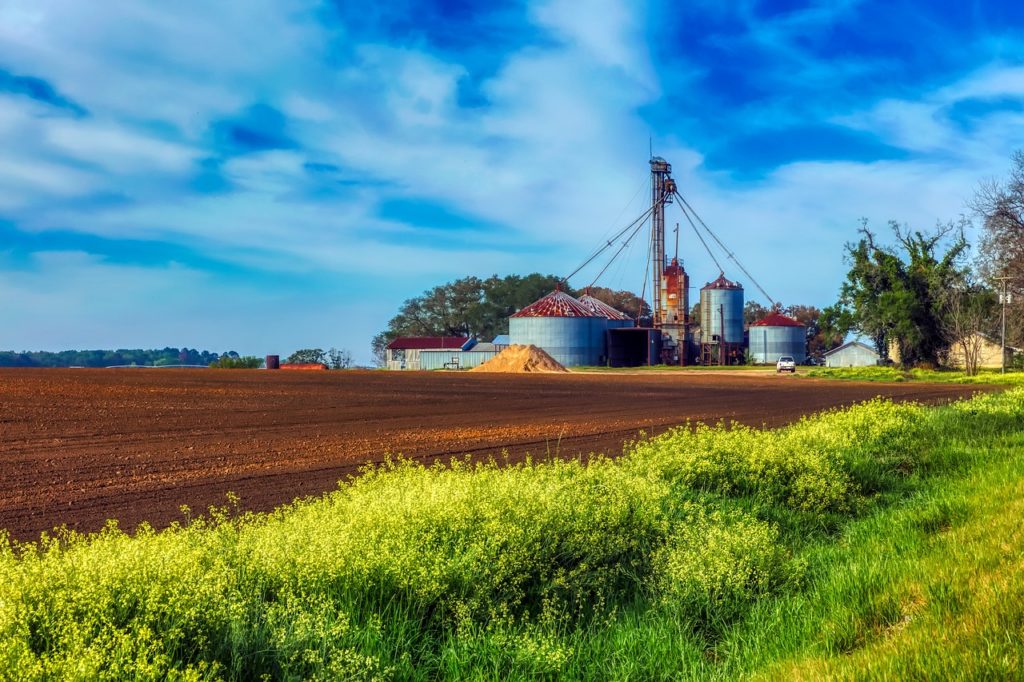How to start homesteading in Georgia
Though modern Georgia boasts bustling Atlanta, the busiest airport in the world and the headquarters for carbonated beverage behemoth Coca-Cola, the state has long been defined by its agricultural exports. Aside from the juicy fruit that earned its state nickname, the Peach State, Georgia is known for its peanut crops and its Vidalia onions, which are considered some of the sweetest in the world.

Agriculture contributes approximately $73.3 billion annually to Georgia’s economy, according to the University of Georgia Center for Agribusiness & Economic Development. One in seven Georgians works in agriculture, forestry or related fields. Because agriculture is such a booming, established industry in Georgia, though, there are fewer resources set up for first-time farmers to break into the scene than in other states.
If you think homesteading in the Peach State sounds peachy, here’s how to start homesteading in Georgia.
Buying farmland in Georgia
According to 2019 data from the United States Department of Agriculture (USDA), the average cost of farm real estate in Georgia was $3,470 per acre, slightly higher than the national average of $3,160 that same year. The average cost per acre for cropland was $3,210 and $3,730 for pasture.
As of 2018, Georgia had 10.1 million acres of farmland and a total of 41,600 farms. The average farm size was 243 acres.
Whether you are a farm business, food processor, or distributor in the state of Georgia, you will need a current Georgia Business License, which are issued by city and county governments. The process for acquiring a business license may differ depending on city or county requirements.
The Georgia Department of Agriculture administers numerous federal grants and cooperative agreements through its various departmental divisions, but it does not offer any grants that are available to individuals or businesses, including farms.
Growing crops in Georgia
Collectively, vegetables are worth an estimated $650 million to Georgia’s agricultural economy. Georgia ranks third in the United States in acreage of fresh-market vegetables planted. Georgia farmers produce more than 30 different vegetable crops on a commercial scale.
The USDA hardiness zones in Georgia range from 6a to 9a, layered in ascending order from north to south.

Every county in Georgia in engaged in some form of agricultural production. Approximately two-thirds of Georgia’s vegetables are grown in the southwest quarter of the state, where abundant water resources and transportation corridors benefit agricultural production. In recent years, however, vegetable production in the slightly-warmer southeastern quarter of the state has increased. Vidalia onions are produced exclusively in this area, and other vegetable crops are now grown in the region as well. North of Atlanta, there is a small area of concentrated production related to cabbage, pumpkins, tomatoes, and sweet corn. There is also an increasing number of pick-your-own enterprises around most of the state’s metropolitan areas.
Despite the fact that Georgia is known as the Peach State, it ranks third domestically in the production of peaches behind California and South Carolina. Still, Georgia is the number one state in the nation in the production of peanuts, pecans, blueberries and spring onions, as well as fresh-market cucumbers, collards, lima beans and turnip greens. The state is also near the top in the production of cotton, watermelon, eggs, cucumbers, sweet corn, bell peppers, tomatoes, cantaloupes, rye and cabbage. Vidalia onions are the leading vegetable crop in terms of value, while watermelons are grown on the most acres.
Another great crop to grow in Georgia is okra, which is grown in every county, though law enforcement often mistakes its leaves for marijuana and have raided farmers as a result. The three varieties of okra require Georgia’s soil for its excellent water holding capacity.
Vegetable production in Georgia generally requires intensive management and large capital inputs. The warm, humid climate, though ideal for vegetable growth, is also ideal for many plant diseases, insects and weeds. Irrigation is also required during dry periods.
According to the Georgia Department of Natural Resources, withdrawal of over 100,000 gallons of water per day will require a permit. Southwest or coastal Georgia have more restrictions, though, and some aquifers are off-limits for agricultural withdrawal altogether.
Through the Georgia Department of Agriculture, the Georgia Soil and Water Conservation Commission, the University of Georgia Cooperative Extension Service, and other partners, entities with farm-related water use permits are encouraged to use the most efficient.
Much of the early history of Georgia involved successive clearing and conversion of forests to croplands and intensive agricultural production, which to the extensive erosion of upland areas in Georgia’s Piedmont. The top foot or more of soil disappeared over several decades. Organic matter is now increasing in the soils of Georgia thanks to efforts like the conversion of cropland into forests and the utilization of conservation tillage in croplands.
Georgia is known for “red clay” soil, which is the result of long-term weathering processes that leave behind iron oxides. The soils of the Appalachian Plateau are generally thin and acidic, making them unsuited for farming. The lowland soils in the Piedmont region, coupled with the streams that run along the valleys, are more supportive of agricultural activity. The Coastal Plain’s porous limestone soils are a part of the Floridian Aquifer, one of the largest sources of freshwater east of the Mississippi River, which holds rainwater underground that can be used for drinking and agriculture. Most agricultural soil is found on the Upper Coastal Plain, and the Lower Coastal Plain features the sandy and nutrient-poor soils of the state’s coastal islands and swamps.
Raising animals in Georgia
Animal agriculture is the largest sector of agriculture in Georgia, contributing over $5.8 billion annually. Georgia is one of the leading egg and broiler chicken producing states. The poultry and egg industry accounted for 57 percent of Georgia’s farm commodities. Beef cattle, hogs and milk are also important to Georgia’s livestock economy.
According to Georgia Fence Law, no owner shall permit livestock to run at large on or to stray upon the public roads of this state or any property not belonging to the owner of the livestock, except by permission of the owner of such property.
It shall be the duty of the sheriff, his deputies or any other county law enforcement officer to impound livestock found to be running at large or straying. Owners or operators of farms may also impound such livestock, provided that the livestock is kept in a suitable place and cared for properly.
According to the USDA, all livestock transported or otherwise moved into Georgia need to be accompanied by a copy of an official certificate of veterinary inspection or permit, or both, attached to the waybill or shall be in the possession of the driver of the vehicle or person in charge of the livestock. All livestock not fully in compliance entering the state without a proper certificate of veterinary inspection or permit, or both when required, shall be held in quarantine at owner’s risk and expense until released by the State Veterinarian.
Any animal originating from a state or area where screwworms have become established shall not be transported into Georgia unless the State Veterinarian has issued a prior permit. Cattle suffering from epithelioma may be shipped into Georgia provided they are accompanied by a special permit, but must be consigned to a state or federally approved slaughter establishment. No cattle with positive titers to Anaplasmosis can be transported into Georgia. There are no restrictions on healthy animals and poultry moving direct to slaughter, except on swine originating from garbage feeding operations, which may not enter Georgia under any conditions.
There are several livestock auctions that take place throughout the state of Georgia, including North Georgia Livestock Auction in Athens, South Central Livestock Stockyard in Fitzgerald, Franklin County Livestock in Carnesville, Swainsboro Stockyard in Swainsboro and the Turner County Stockyard in Ashburn. A list of livestock sales can be found on the Georgia Department of Agriculture website.
Selling food in Georgia
The Georgia Department of Agriculture has 99 farmers markets listed on its website. Per the Georgia Farmers Market Guide, selling unaltered fresh produce does not require a license or registration. However, if the product is processed in any way, such as slicing or freezing the product, it then requires a food license.
A person may not operate a food sales establishment without a valid license to operate issued by the Georgia Department of Agriculture. The Commissioner of the department charges the fees for licenses based on the level of risk. For example, a license to sell “Tier 1” foods, including raw, unprocessed agricultural commodities, costs $100 and rises progressively by $50 in each subsequent tier.
The Cottage Food License allows cottage food operators to produce non-potentially hazardous foods in home kitchens to sell to the end users. Cottage food operators can sell these products in Georgia directly to the consumer at non-profit events and for-profit events (such as farmers markets) as well as through internet sales. Licensed cottage food operators are not allowed to distribute or wholesale their product, nor can they ship cottage food products across state lines.
Cottage Food Operators must complete an American National Standards Institute accredited food safety training program. Typically, there are different levels of training courses available, including Food Handler and Certified Food Manager courses. Food handler training is acceptable for Cottage Food Operators according to the Cottage Food Regulations.
Cottage food products cannot be distributed or sold wholesale to retail stores, restaurants or other institutions. To distribute, wholesale or to sell products across state lines, a Food Sales Establishment License is required. Domestic kitchens cannot be licensed as food sales establishments.
Cottage food products include bread, cakes, pastries, candies, fruit pies, jams, dried fruits, dry herbs, seasonings, trail mixes, nuts, vinegar and popcorn.
Obtaining a Cottage Food License in Georgia requires the applicant to provide secure and verifiable information to verify citizenship and immigration status.
Labeling is required for cottage food products, and the method will vary depending on the manner of sale. For direct sale to individual consumers, for example, cottage food labels require the business name and home address of the operator, as well as the following statement, shall be conspicuously labeled on the package: “MADE IN A COTTAGE FOOD OPERATION THAT IS NOT SUBJECT TO STATE FOOD SAFETY INSPECTIONS.” Prepacked cottage food product labels should include the business name and home address of the operator; the common name of the product; the ingredients in descending order of predominance by weight; the net weight or volume of the product; allergen labeling as specified by FDA labeling requirements; appropriate nutritional information as specified by FDA labeling requirements if a nutritional claim is made; and the aforementioned statement.
Individuals who wish to produce and offer for sale shell eggs in Georgia must comply with The Georgia Egg Law which states, “Each egg candler and grader, of eggs offered for sale, shall obtain a license from the Department of Agriculture at no cost, after demonstrating to the satisfaction of the department his capability and qualifications as an egg candler and grader.”
This license can be obtained from a representative from the Georgia Department of Agriculture by successfully taking and passing a written examination and a candling examination.
Georgia organizations for new farmers
- Georgia Fruit and Vegetable Growers Association
- Georgia Agribusiness Council
- Georgia Women in Agriculture Association
- Farm Bureau Georgia
- Georgia Organics
- Georgia Grown
- Georgia Farmers Market Association
- University of Georgia Cooperative Extension

How difficult is it to start homesteading in Georgia?
Agriculture plays an enormous role in Georgia’s economy. The land is cheaply priced, and the long growing season and favorable climate allow for opportunities to raise many different kinds of crops and livestock. However, because the industry is so established, there are not as many financial resources in place to help new farmers and homesteaders get started.
